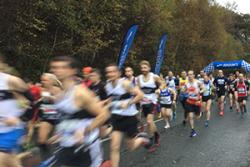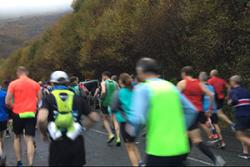Want to become self-compassionate? Run a marathon
![]() This article by , PhD Researcher in Behavioural and Positive Psychology, at the School of Psychology, was originally published on . Read the .
This article by , PhD Researcher in Behavioural and Positive Psychology, at the School of Psychology, was originally published on . Read the .
Unsurprisingly, running a marathon is tough. It takes months of training before runners even make it to the starting line and this preparation can, at times, feel like punishment. The marathon runner in training can often be found limping around with blisters, sore muscles and blackened or lost toenails. Not, perhaps, an image we might naturally associate with the idea of “self-compassion”.
 Runners at the start of the recent Snowdonia MarathonA relatively new concept, self-compassion has been hailed as a . While compassion refers to the demonstration of sympathy and concern for others in times of suffering, self-compassion entails showing this .
Runners at the start of the recent Snowdonia MarathonA relatively new concept, self-compassion has been hailed as a . While compassion refers to the demonstration of sympathy and concern for others in times of suffering, self-compassion entails showing this .
One of first skills needed for self-compassion is self-kindness – extending compassion to yourself, even when you feel like you have failed, which can be challenging to say the least. Often when faced with failure, we implicitly assume self-criticism is necessary in order to motivate strong future performance. But in reality this . Giving oneself a harsh talking to doesn’t just make us feel bad, it also interferes with our ability to calmly examine a situation and identify what to change in order to improve – an essential component of .
Perhaps this explains why studies have found positive associations between self-compassion and , and strong .
But what does all of this have to do with running a marathon?
Training for a marathon can revolutionise self-perception, making kind self-talk – where you speak directly to yourself either mentally or out loud – easier for even the most reluctant of individuals. This shift isn’t prompted by changes in physique, but of mind. After dedicating oneself to a marathon, the anatomy receives a perceptual upgrade and transforms from a mere body into an essential tool. You begin to see the true value in your own body and the strength that it has.
Research suggests that working towards purposeful goals , so under the conditions of marathon training, self-care – looking after ourselves physically – is not only viewed as essential for performance, but as something we deserve. Commit to a goal, invest time, energy and emotion in that goal, and anything that threatens the performance of the body – literally the vehicle needed to carry you to your end target – is unacceptable.
 Heading into the mountains at the start of the Snowdonia Marathon, said to be one of Europe's toughest marathons.This relates to the second element of self-compassion: a balanced perspective. Described as caring for ourselves in an enduring way, a balanced perspective ensures happiness and health in the long-term. This can also be tricky, given we are typically geared toward instant gratification and struggle to connect the immediate rewards of pleasurable items such as food, alcohol and cigarettes, with their long-term consequences. In fact, neurological research suggests that we literally .
Heading into the mountains at the start of the Snowdonia Marathon, said to be one of Europe's toughest marathons.This relates to the second element of self-compassion: a balanced perspective. Described as caring for ourselves in an enduring way, a balanced perspective ensures happiness and health in the long-term. This can also be tricky, given we are typically geared toward instant gratification and struggle to connect the immediate rewards of pleasurable items such as food, alcohol and cigarettes, with their long-term consequences. In fact, neurological research suggests that we literally .
However, training for a marathon can help perceptual balance, because it directs our attention away from our immediate concerns and towards the future. Research suggests that goals cognitively activate stimuli . This means the motivation to complete a marathon makes objects and activities which are relevant to our long-term health implicitly attractive and easier to engage with.
More specifically, setting a goal which requires us to plan and monitor progress over weeks or months can help to bridge the gap between current and future happiness. Sticking to a schedule and , such as identifying weekly mileage goals and achieving new distance targets, can make us more willing to make choices that will benefit us later on. This might be resisting the instant pleasure of one too many drinks on a Friday night, or getting enough sleep so that we feel at our best when training.
The third and final component of self-compassion is common humanity. This refers to the understanding that suffering is a natural and shared part of being human. Based on the idea that feeling isolated in our pain and insecurity, common humanity is an important part of .
Running is sometimes considered an isolated and fiercely competitive sport, but this isn’t necessarily true. Runners step in to help one another in times of difficulty – just who helped fellow runner David Wyeth complete the last 300m of the 2017 London Marathon, to the detriment of his own timing. Running provides a sense of human connection, because it shows that struggle is normal. Being one in a field of thousands, communally suffering in the pursuit of a common goal, is paradoxically satisfying. Perhaps because it allows us to appreciate just how small we are in the scheme of things.
So, while marathon training may be painful, sometimes we have to experience a degree of suffering in order to truly value ourselves, to appreciate others, and to learn what it means to be self-compassionate.
( You mat also be interested to read :/news/latest/what-causes-marathon-runners-and-other-extreme-sport-enthusiasts-to-catch-colds-34422)
Publication date: 3 November 2017
